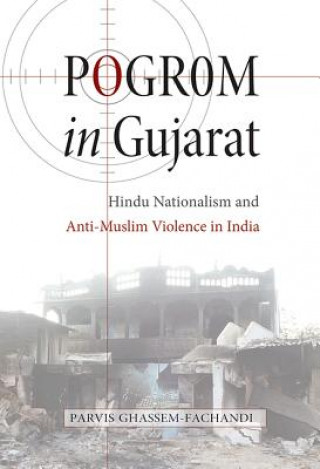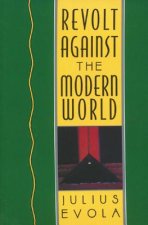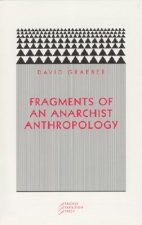
Kód: 04460025
Pogrom in Gujarat
Autor Ghassem-Fachandi
In 2002, after an altercation between Muslim vendors and Hindu travelers at a railway station in the Indian state of Gujarat, fifty-nine Hindu pilgrims were burned to death. The ruling nationalist Bharatiya Janata Party blamed Guj ... celý popis
- Jazyk:
 Angličtina
Angličtina - Väzba: Brožovaná
- Počet strán: 320
Nakladateľ: Princeton University Press, 2012
- Viac informácií o knihe

45.85 €

Skladom u dodávateľa v malom množstve
Odosielame za 10 - 14 dní
Potrebujete viac kusov?Ak máte záujem o viac kusov, preverte, prosím, najprv dostupnosť titulu na našej zákazníckej podpore.
Pridať medzi želanie
Mohlo by sa vám tiež páčiť
-

Molecular Machines
214.07 € -

The Time Has Come...
11.02 € -22 % -

Computed Tomography Imaging in 2012, An Issue of Cardiology Clinics
109.69 € -

Pád titanov
18.37 € -31 %
Darčekový poukaz: Radosť zaručená
- Darujte poukaz v ľubovoľnej hodnote, a my sa postaráme o zvyšok.
- Poukaz sa vzťahuje na všetky produkty v našej ponuke.
- Elektronický poukaz si vytlačíte z e-mailu a môžete ho ihneď darovať.
- Platnosť poukazu je 12 mesiacov od dátumu vystavenia.
Viac informácií o knihe Pogrom in Gujarat
Nákupom získate 114 bodov
 Anotácia knihy
Anotácia knihy
In 2002, after an altercation between Muslim vendors and Hindu travelers at a railway station in the Indian state of Gujarat, fifty-nine Hindu pilgrims were burned to death. The ruling nationalist Bharatiya Janata Party blamed Gujarat's entire Muslim minority for the tragedy and incited fellow Hindus to exact revenge. The resulting violence left more than one thousand people dead - most of them Muslims - and tens of thousands more displaced from their homes. Parvis Ghassem-Fachandi witnessed the bloodshed up close. In "Pogrom in Gujarat", he provides a riveting ethnographic account of collective violence in which the doctrine of ahimsa - or nonviolence - and the closely associated practices of vegetarianism became implicated by legitimating what they formally disavow. Ghassem-Fachandi looks at how newspapers, movies, and other media helped to fuel the pogrom. He shows how the vegetarian sensibilities of Hindus and the language of sacrifice were manipulated to provoke disgust against Muslims and mobilize the aspiring middle classes across caste and class differences in the name of Hindu nationalism. Drawing on his intimate knowledge of Gujarat's culture and politics and the close ties he shared with some of the pogrom's sympathizers, Ghassem-Fachandi offers a strikingly original interpretation of the different ways in which Hindu proponents of ahimsa became complicit in the very violence they claimed to renounce.
 Parametre knihy
Parametre knihy
Zaradenie knihy Knihy po anglicky Society & social sciences Sociology & anthropology Anthropology
45.85 €
- Celý názov: Pogrom in Gujarat
- Autor: Ghassem-Fachandi
- Jazyk:
 Angličtina
Angličtina - Väzba: Brožovaná
- Počet strán: 320
- EAN: 9780691151779
- ISBN: 0691151776
- ID: 04460025
- Nakladateľ: Princeton University Press
- Hmotnosť: 522 g
- Rozmery: 235 × 155 × 21 mm
- Dátum vydania: 19. March 2012
Obľúbené z iného súdka
-

Revolt Against the Modern World
30.63 € -2 % -

Crisis of the Modern World
17.66 € -

Society Against the State
24.40 € -2 % -

Trickster Makes This World
12.25 € -23 % -

Purity and Danger
23.18 € -4 % -

Gene Wars
28.69 € -

Exercised
13.06 € -22 % -

Consider The Lobster
10.71 € -20 % -

Face and Mask
66.38 € -

Combatting Cult Mind Control
20.83 € -

Nordic Theory of Everything
12.25 € -23 % -

Fragments of an Anarchist Anthropology
13.27 € -6 % -

Cambridge Encyclopedia of Human Evolution
115 € -

Why Is Sex Fun?
11.12 € -23 % -

Catching Fire
12.96 € -23 % -

Five Roles of a Master Herder
16.94 € -16 % -

Great Paleolithic War
60.66 € -9 % -

Nature, Ritual, and Society in Japan's Ryukyu Islands
81.60 € -

Dancing with the Dead
38.70 € -

Our Origins
97.43 € -4 % -

Revealing Lateglacial Landscapes
45.54 € -

Bones of Contention
52.49 € -

Interaction Ritual
86.71 € -

Exploration and Discovery - Treasures of the Yale Peabody Museum of Natural History
24.81 € -10 % -

Watching the English
11.23 € -25 % -

Utopia Of Rules
17.35 € -19 % -

Continuum Concept
13.47 € -20 % -

Kill All Normies - Online culture wars from 4chan and Tumblr to Trump and the alt-right
11.84 € -20 % -

Ritual
12.96 € -21 % -

Totem and Taboo
7.34 € -23 % -

How Forests Think
38.90 € -

Designs for the Pluriverse
34.51 € -3 % -

When Languages Die
36.76 € -

Protestant Ethic and Other Writings
16.54 € -23 % -

Human Story
14.39 € -23 % -

On Saudi Arabia
19.70 € -8 % -

Limits to Medicine
16.13 € -16 % -

Small Places, Large Issues
25.83 € -10 % -

Think Like an Anthropologist
12.25 € -23 % -

Sixty Million Frenchmen Can't Be Wrong
18.78 € -19 % -

Botany of Desire
16.54 € -23 % -

Direct Action: An Ethnography
29.81 € -4 % -

Ayahuasca Visions
33.19 € -18 % -

Alexander Dumas Dictionary Of Cuisine
80.37 € -

Stone Age Economics
23.18 € -4 % -

Oxford Handbook of Language Evolution
57.70 € -

Possibilities
19.50 € -19 % -

On Kings
32.16 € -

Memorial Museums
60.66 €
Osobný odber Bratislava a 2642 dalších
Copyright ©2008-24 najlacnejsie-knihy.sk Všetky práva vyhradenéSúkromieCookies


 21 miliónov titulov
21 miliónov titulov Vrátenie do mesiaca
Vrátenie do mesiaca 02/210 210 99 (8-15.30h)
02/210 210 99 (8-15.30h)